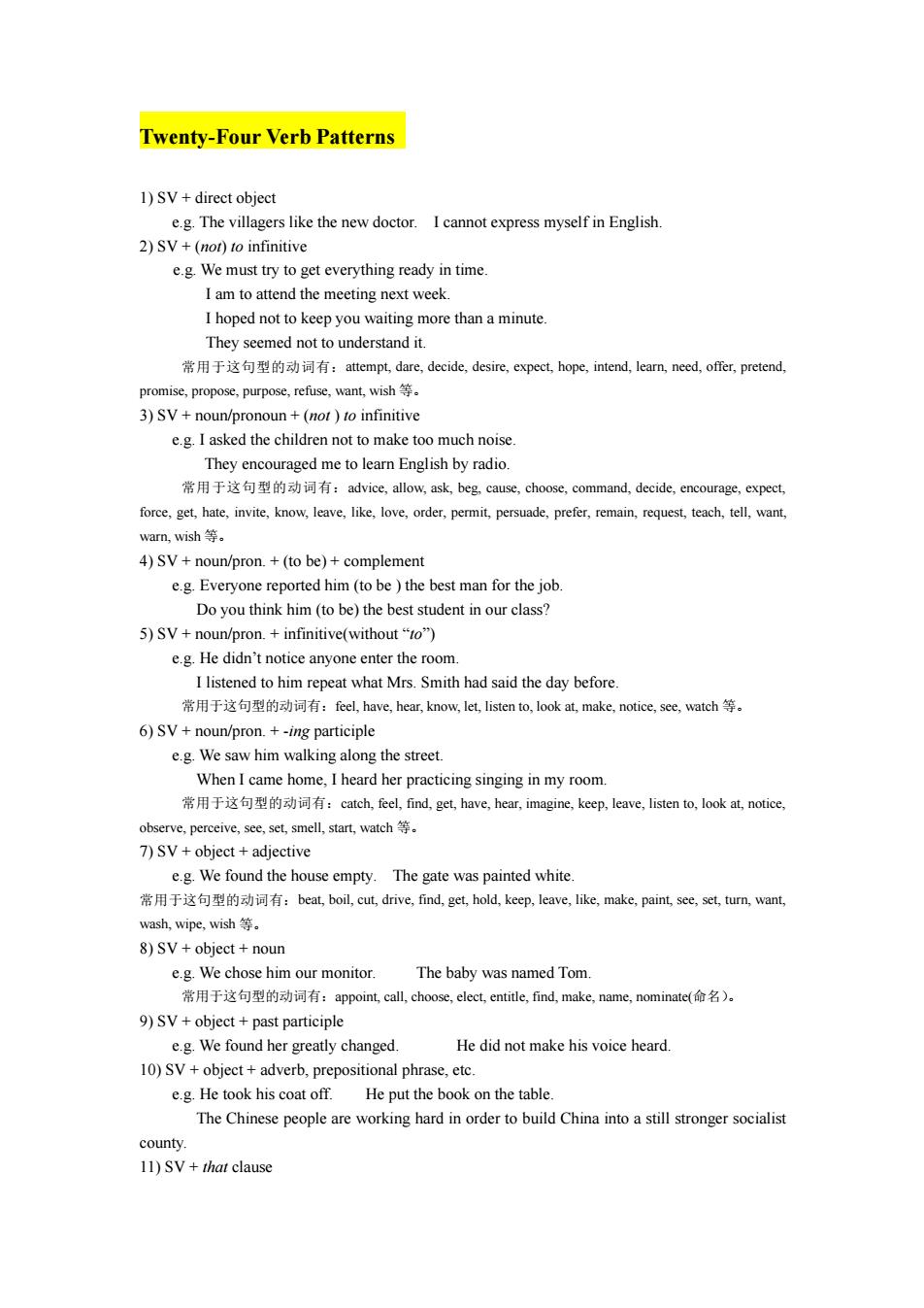
Twenty-Four Verb Patterns 1)SV+direct object e.g.The villagers like the new doctor.I cannot express myself in English. 2)SV+(not)to infinitive e.g.We must try to get everything ready in time. I am to attend the meeting next week. I hoped not to keep you waiting more than a minute. They seemed not to understand it. 常用于这句型的动词有:attempt,dare,decide,.desire,expect,hope,intend,learn,need,ofer,pretend,. promise,propose,purpose,refuse,want,wish 3)SV noun/pronoun+(not to infinitive e.g.I asked the children not to make too much noise. They encouraged me to learn English by radio. 常用于这句型的动词有:advice,allow,ask,beg,cause,choose,command,decide,encourage,.expect, force,get,hate,invite,know,leave,like,love,order,permit,persuade,prefer,remain,request,teach,tell,want, warn,wish等。 4)SV+noun/pron.+(to be)+complement e.g.Everyone reported him (to be )the best man for the job. Do you think him (to be)the best student in our class? 5)SV+noun/pron.+infinitive(without“to") e.g.He didn't notice anyone enter the room. I listened to him repeat what Mrs.Smith had said the day before. 常用于这句型的动词有:feel,have,hear,know,let,listento,look at,make,notice,see,watch等。 6)SV noun/pron.+-ing participle e.g.We saw him walking along the street. When I came home,I heard her practicing singing in my room. 常用于这句型的动词有:catch,feel,find,get,have,hear,imagine,.keep,leave,.listen to,.look at,notice, observe,perceive,see,set,smell,start,watch. 7)SV+object +adjective e.g.We found the house empty.The gate was painted white. 常用于这句型的动词有:beat,boil,cut,drive,find,get,hold,keep,leave,like,make,paint,.see,set,turm,want, wash,wipe,wish等。 8)SV+object noun e.g.We chose him our monitor. The baby was named Tom. 常用于这句型的动词有:appoint,cal,choose,elect,.entitle,find,make,name,nominate(命名)。 9)SV+object+past participle e.g.We found her greatly changed. He did not make his voice heard. 10)SV+object+adverb,prepositional phrase,etc. e.g.He took his coat off.He put the book on the table. The Chinese people are working hard in order to build China into a still stronger socialist county. 11)SV+that clause
Twenty-Four Verb Patterns 1) SV + direct object e.g. The villagers like the new doctor. I cannot express myself in English. 2) SV + (not) to infinitive e.g. We must try to get everything ready in time. I am to attend the meeting next week. I hoped not to keep you waiting more than a minute. They seemed not to understand it. 常用于这句型的动词有:attempt, dare, decide, desire, expect, hope, intend, learn, need, offer, pretend, promise, propose, purpose, refuse, want, wish 等。 3) SV + noun/pronoun + (not ) to infinitive e.g. I asked the children not to make too much noise. They encouraged me to learn English by radio. 常用于这句型的动词有:advice, allow, ask, beg, cause, choose, command, decide, encourage, expect, force, get, hate, invite, know, leave, like, love, order, permit, persuade, prefer, remain, request, teach, tell, want, warn, wish 等。 4) SV + noun/pron. + (to be) + complement e.g. Everyone reported him (to be ) the best man for the job. Do you think him (to be) the best student in our class? 5) SV + noun/pron. + infinitive(without “to”) e.g. He didn’t notice anyone enter the room. I listened to him repeat what Mrs. Smith had said the day before. 常用于这句型的动词有:feel, have, hear, know, let, listen to, look at, make, notice, see, watch 等。 6) SV + noun/pron. + -ing participle e.g. We saw him walking along the street. When I came home, I heard her practicing singing in my room. 常用于这句型的动词有:catch, feel, find, get, have, hear, imagine, keep, leave, listen to, look at, notice, observe, perceive, see, set, smell, start, watch 等。 7) SV + object + adjective e.g. We found the house empty. The gate was painted white. 常用于这句型的动词有:beat, boil, cut, drive, find, get, hold, keep, leave, like, make, paint, see, set, turn, want, wash, wipe, wish 等。 8) SV + object + noun e.g. We chose him our monitor. The baby was named Tom. 常用于这句型的动词有:appoint, call, choose, elect, entitle, find, make, name, nominate(命名)。 9) SV + object + past participle e.g. We found her greatly changed. He did not make his voice heard. 10) SV + object + adverb, prepositional phrase, etc. e.g. He took his coat off. He put the book on the table. The Chinese people are working hard in order to build China into a still stronger socialist county. 11) SV + that clause

e.g.I believe (that)you have done your best.I don't suppose (that it's the rush hour yet. 常用于这句型的动词有:admit,.believe,command,confess,,declare,,demand,.deny,doubt,expect,explain, feel(觉得),hear(听说),hope,imagine,.intend,.know,mean,mind(当心),notice,propose,.request,.report,.say, see(看出),show,suggest,.suppose,think,understand,wish,wonder((觉得奇怪)。 12)SV noun/pron that clause e.g.My secretary reminded me that I had a meeting to attend that evening. We satisfied ourselves that the plan would work. 常用于这句型的动词有:assure,inform,promise,remind,teach,tel,wam等。 13)SV+conjunctive to infinitive e.g.We shall learn how to use the meter. He cannot decide what time to leave. 14)SV+noun/pron conjunctive to infinitive e.g.Will you show me how to operate the machine? He will tell you when to begin the work 15)SV+wh-words clause e.g.I wonder whether the material is heat-resistant. Does he know when she will return from abroad? 常用于这句型的动词有:ask,consider,,decide,discover,explain,.find out,.forget,.guess,inquire,know, learn,observe,remember,see,settle,tell,think,understand,wonder 16)SV+noun/pron +wh-words clause e.g.He told me how they had put the plan into practice. She asked me where I was off to. 常用于这句型的动词有:advise,.ask,inform,show,teach,tell. 17)SV +-ing participle e.g.I remember meeting him a year ago. These machines want taking care of. 常用于这句型的动词有:admit,advise,avoid,.consider,defend,enjoy,excuse,.finish,forbid,mind,miss, practise,risk,suggest,give up,can't help 18)SV+direct object +tolfor object e.g.He offered a Chinese-English dictionary to me. My mother bought a new jacket for me yesterday. Don't throw stones at the dog 间接宾语前需要加to的常用动词有:allow,bring,deny,do(带来),give,grant,hand,leave,lend,ofer, owe,pass,pay,permit,promise,read,refuse,render,restore,sell,send,show,teach,tell wish,write 间接宾语前需要加for的常用动词有:bring,buy,cash,choose,fetch,get,leave,make,order,paint, play(演奏),save,sing,spare等。 19)SV +indirect object +direct object e.g.Will you lend me some money?Her husband bought her a new dress. My teacher asked me a question. 20)SV+(for)+complement e.g.The meeting lasted five hours. We waited (for)more than two days. 21)SV e.g.The clock doesn't work. The sun rose. 22)SV+predicative e.g.He is a teacher. The leaves have turned read
e.g. I believe (that) you have done your best. I don’t suppose (that ) it’s the rush hour yet. 常用于这句型的动词有:admit, believe, command, confess, declare, demand, deny, doubt, expect, explain, feel(觉得), hear(听说), hope, imagine, intend, know, mean, mind(当心), notice, propose, request, report, say, see(看出),show, suggest, suppose, think, understand, wish, wonder(觉得奇怪)。 12) SV + noun/pron + that clause e.g. My secretary reminded me that I had a meeting to attend that evening. We satisfied ourselves that the plan would work. 常用于这句型的动词有:assure, inform, promise, remind, teach, tell, warm 等。 13) SV + conjunctive + to infinitive e.g. We shall learn how to use the meter. He cannot decide what time to leave. 14) SV+ noun/pron + conjunctive + to infinitive e.g. Will you show me how to operate the machine? He will tell you when to begin the work. 15) SV + wh-words clause e.g. I wonder whether the material is heat-resistant. Does he know when she will return from abroad? 常用于这句型的动词有:ask, consider, decide, discover, explain, find out, forget, guess, inquire, know, learn, observe, remember, see, settle, tell, think, understand, wonder 等。 16) SV + noun/pron + wh-words clause e.g. He told me how they had put the plan into practice. She asked me where I was off to. 常用于这句型的动词有:advise, ask, inform, show, teach, tell. 17) SV + -ing participle e.g. I remember meeting him a year ago. These machines want taking care of. 常用于这句型的动词有:admit, advise, avoid, consider, defend, enjoy, excuse, finish, forbid, mind, miss, practise, risk, suggest, give up, can't help 等。 18) SV + direct object + to/for + object e.g. He offered a Chinese-English dictionary to me. My mother bought a new jacket for me yesterday. Don’t throw stones at the dog. 间接宾语前需要加 to 的常用动词有:allow, bring, deny, do(带来), give, grant, hand, leave, lend, offer, owe, pass, pay, permit, promise, read, refuse, render, restore, sell, send, show, teach, tell wish, write 等。 间接宾语前需要加 for 的常用动词有:bring, buy, cash, choose, fetch, get, leave, make, order, paint, play(演奏),save, sing, spare 等。 19) SV + indirect object + direct object e.g. Will you lend me some money? Her husband bought her a new dress. My teacher asked me a question. 20) SV + (for) + complement e.g. The meeting lasted five hours. We waited (for) more than two days. 21) SV e.g. The clock doesn’t work. The sun rose. 22) SV + predicative e.g. He is a teacher. The leaves have turned read

除了be系动词外,还有一些动词也可以用作系动词,I)表感官的动词,feel,smeL,taste,sound,look, appear,.seem等。2)表转变变化的动词,become,get,grow,turm,go,等。3)表延续的动词remain,keep,seem, hold,stay,rest等。4)表瞬时的动词come,fal,set,cut,occur等5)其他动词eat,lie,prove,.ring,run,shine,.sit, stand,continue,hang 23)SV+adverbial adjunct e.g.The sun sets in the west. They will come as soon as they are ready 24)SV+prep+prepositional object e.g.You may count on my help.He succeeded in solving the problem
除了 be 系动词外,还有一些动词也可以用作系动词,1)表感官的动词,feel, smell, taste, sound, look, appear, seem 等。2) 表转变变化的动词,become, get, grow, turn, go,等。 3)表延续的动词 remain, keep, seem, hold, stay, rest 等。4)表瞬时的动词 come, fall, set, cut, occur 等 5)其他动词 eat, lie, prove, ring, run, shine, sit, stand, continue, hang 等。 23) SV + adverbial adjunct e.g. The sun sets in the west. They will come as soon as they are ready. 24) SV + prep + prepositional object e.g. You may count on my help. He succeeded in solving the problem